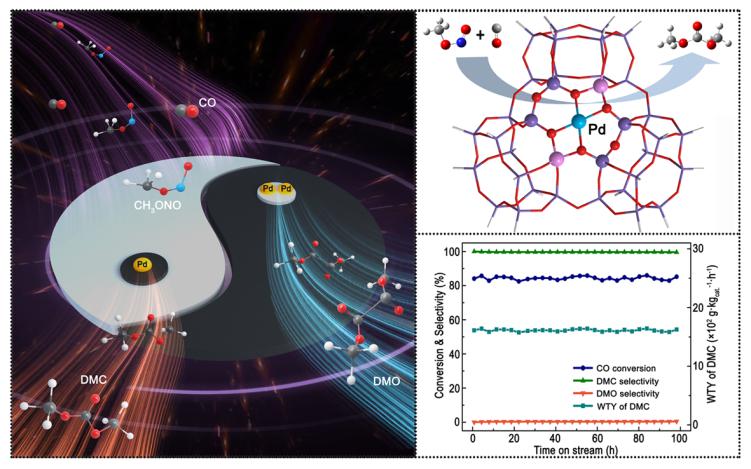As an important chemical product, dimethyl carbonate (DMC) is widely used in the lithium battery and polycarbonate industries.
The mainstream transesterification method for DMC production has some drawbacks, such as expensive cost and serious pollution. By comparison, the raw materials of CO esterification to DMC are only CH3OH, CO and O2, with low cost and strong competitive advantages. However, due to the bottleneck of catalyst, the route of CO esterification to DMC has not been industrialized.
In a study published in ACS Catalysis, Prof. GUO Guocong’s group and Prof. ZHUANG Wei’s group from Fujian Institute of Research on the Structure of Matter (FJIRSM) of the Chinese Academy of Sciences (CAS) cooperatively reported a high-performance Pd-based catalyst applied for CO esterification to DMC.
Based on the pervious experiment results that Pd(II) catalyst was inclined to produce DMC while Pd(0) catalyst to another product of dimethyl oxalate (DMO), researchers revealed that the catalytic functional motifs of product selectivity via density functional theory (DFT) calculations.
They found that mononuclear Pd sites benefits the production of DMC via Eley-Rideal mechanism, while binuclear Pd sites promotes the other product of dimethyl oxalate (DMO) via Langmuir-Hinshelwood mechanism.
Furthermore, catalyst with mononuclear Pd sites anchored on zeolite was successfully achieved by theoretical design and controllable synthesis.Through aberration-corrected HAADF-STEM and XAFS characterization, it was confirmed that the mononuclear Pd sites in catalyst was in the coordination structure of PdO4, which was consistent with the structure of designed model.
This study revealed that this as-synthesized catalyst exhibited superior catalytic performance: >80% CO conversion, 100% DMC selectivity, without decay in 100 h evaluation. It would accelerate the industrialization progress of CO esterification to DMC technology.

Scheme of the catalytic functional motifs of products selectivity and the catalytic performance (Image by Prof. GUO’s group)
Contact:
Prof. GUO Guocong
Fujian Institute of Research on the Structure of Matter
Chinese Academy of Sciences
Email: gcguo@fjirsm.ac.cn